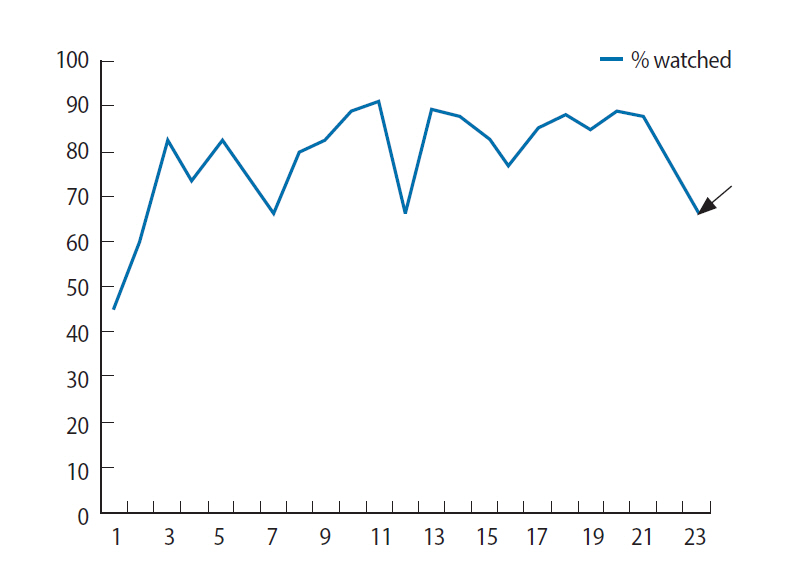J Educ Eval Health Prof.
2016;13:11. 10.3352/jeehp.2016.13.11.
Flipping the advanced cardiac life support classroom with team-based learning: comparison of cognitive testing performance for medical students at the University of California, Irvine, United State
- Affiliations
-
- 1Department of Emergency Medicine, University of California-Irvine School of Medicine, Orange, CA, USA. milangdo@uci.edu
- 2University of California-Irvine School of Medicine, Orange, CA, USA.
- 3Department of Anesthesiology and Perioperative Care, University of California-Irvine School of Medicine, Orange, CA, USA.
- 4Department of Microbiology and Molecular Genetic, University of California-Irvine School of Medicine, Orange, CA, USADivision of Educational Technology, University of California-Irvine School of Medicine, Orange, CA, USA.
- 5Department of Microbiology and Molecular Genetics, University of California-Irvine School of Medicine, Orange, CA, USA.
- KMID: 2413760
- DOI: http://doi.org/10.3352/jeehp.2016.13.11
Abstract
- PURPOSE
It aimed to find if written test results improved for advanced cardiac life support (ACLS) taught in flipped classroom/team-based Learning (FC/TBL) vs. lecture-based (LB) control in University of California-Irvine School of Medicine, USA.
METHODS
Medical students took 2010 ACLS with FC/TBL (2015), compared to 3 classes in LB (2012-14) format. There were 27.5 hours of instruction for FC/TBL model (TBL 10.5, podcasts 9, small-group simulation 8 hours), and 20 (12 lecture, simulation 8 hours) in LB. TBL covered 13 cardiac cases; LB had none. Seven simulation cases and didactic content were the same by lecture (2012-14) or podcast (2015) as was testing: 50 multiple-choice questions (MCQ), 20 rhythm matchings, and 7 fill-in clinical cases.
RESULTS
354 students took the course (259 [73.1%] in LB in 2012-14, and 95 [26.9%] in FC/TBL in 2015). Two of 3 tests (MCQ and fill-in) improved for FC/TBL. Overall, median scores increased from 93.5% (IQR 90.6, 95.4) to 95.1% (92.8, 96.7, P=0.0001). For the fill-in test: 94.1% for LB (89.6, 97.2) to 96.6% for FC/TBL (92.4, 99.20 P=0.0001). For MC: 88% for LB (84, 92) to 90% for FC/TBL (86, 94, P=0.0002). For the rhythm test: median 100% for both formats. More students failed 1 of 3 tests with LB vs. FC/TBL (24.7% vs. 14.7%), and 2 or 3 components (8.1% vs. 3.2%, P=0.006). Conversely, 82.1% passed all 3 with FC/TBL vs. 67.2% with LB (difference 14.9%, 95% CI 4.8-24.0%).
CONCLUSION
A FC/TBL format for ACLS marginally improved written test results.
MeSH Terms
Figure
Cited by 1 articles
-
Medical students’ satisfaction with the Applied Basic Clinical Seminar with Scenarios for Students, a novel simulation-based learning method in Greece
Panteleimon Pantelidis, Nikolaos Staikoglou, Georgios Paparoidamis, Christos Drosos, Stefanos Karamaroudis, Athina Samara, Christodoulos Keskinis, Michail Sideris, George Giannakoulas, Georgios Tsoulfas, Asterios Karagiannis
J Educ Eval Health Prof. 2016;13:13. doi: 10.3352/jeehp.2016.13.13.
Reference
-
References
1. Subramanian A, Timberlake M, Mittakanti H, Lara M, Brandt ML. Novel educational approach for medical students: improved retention rates using interactive medical software compared with traditional lecture-based format. J Surg Educ. 2012; 2012:449–452. http://dx.doi.org/10.1016/j.jsurg.2012.05.013.
Article2. Littlewood KE, Shilling AM, Stemland CJ, Wright EB, Kirk MA. High-fidelity simulation is superior to case-based discussion in teaching the management of shock. Med Teach. 2013; 35:e1003–1010.
Article3. Center for research on learning and teaching. Active learning [Internet]. Ann Arbor, MI: University of Michigan;2012. [cited 2016 Jan 1]. Available from: http://www.crlt.umich.edu/tstrategies/tsal.4. Thompson BM, Schneider VF, Haidet P, Levine RE, McMahon KK, Perkowski LC, Richards BF. Team-based learning at ten medical schools: two years later. Med Educ. 2007; 41:250–257. http://dx.doi.org/10.1111/j.1365-2929.2006.02684.x.
Article5. Wayne DB, Butter J, Siddall VJ, Fudala MJ, Wade LD, Feinglass J, McGaghie WC. Mastery learning of advanced cardiac life support skills by internal medicine residents using simulation technology and deliberate practice. J Gen Intern Med. 2006; 21:251–256. http://dx.doi.org/10.1111/j.1525-1497.2006.00341.x.
Article6. American Heart Association. 2015 ACLS Guideline Update [Internet]. Dalls, TX: American Heart Association;2015. Available from: http://view.heartemail.org/?j=fe581176716c07757410&m=fe681570756c02757514&ls=fdbb1573706d07747d11717762&l=fe8713787760007572&s=fe3015777561047c741379&jb=ffcf14&ju=fe24107971630d7d751274&r=0.7. Sinz E, Navarro K, Soderberg ES. Advanced cardiovascular life support provider manual. Dalls, TX: American Heart Association;2011.8. Rodgers DL, Bhanji F, McKee BR. Written evaluation is not a predictor for skills performance in an advanced cardiovascular life support course. Resuscitation. 2010; 81:453–456. http://dx.doi.org/10.1016/j.resuscitation.2009.12.01.
Article9. Strom SL, Anderson CL, Yang L, Canales C, Amin A, Lotfipour S, McCoy CE, Langdorf MI. Correlation of simulation examination to written test scores for advanced cardiac life support testing: prospective cohort study. West J Emerg Med. 2015; 16:907–912. http://dx.doi.org/10.5811/westjem.2015.10.26974.
Article10. Brame C. Flipping the classroom [Internet]. Nashville, TN: Vanderbilt University Center for Teaching;2013. [cited 2016 Jan 1]. Available from: http://cft.vanderbilt.edu/guides-sub-pages/flipping-the-classroom/.
- Full Text Links
- Actions
-
Cited
- CITED
-
- Close
- Share
- Similar articles
-
- Educational impact of an active learning session with 6-lead mobile electrocardiography on medical students’ knowledge of cardiovascular physiology during the COVID-19 pandemic in the United States: a survey-based observational study
- Exploring the structural relationships between medical students’ motivational regulation, cognitive learning, and academic performance in online learning
- The applicability of a validated team-based learning student assessment instrument to assess United Kingdom pharmacy students' attitude toward team-based learning
- Assessment of students' satisfaction with a student-led team-based learning course
- Efficacy of an asynchronous electronic curriculum in emergency medicine education in the United States



